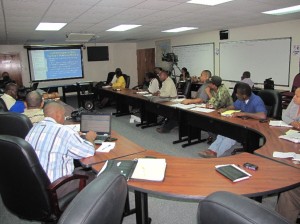
Five regional countries, including Dominica, now being affected by the Black Sigatoka Disease are in the process of putting together a Regional integrated programme for the management of the dreaded disease.
They are optimistic that the plan can be ready for full implementation by January 2013.
Black Sigatoka is a growing threat to regional banana and plantain industries and regional stakeholders have agreed that an effective management programme is essential for the adequate production of quality fruit.
On Thursday, August 16 regional stakeholders met with officials of the Inter-American Institute for Cooperation on Agriculture (IICA) and other partners including the Food and Agriculture Organization (FAO) and the Caribbean Research and Development Institute (CARDI) to discuss a joint response to the emergency via a virtual tele-conference.
IICA’s local technical specialist Ken Coipel said the tele-conference forms part of a wider regional initiative in tackling the disease.
“What we have had is a number of requests from Governments through organizations such as IICA, CARDI, the FAO and CARICOM for assistance to address the Black Sigatoka problem. What these institutions are doing is to work together to ensure that, what is being proposed at the national level will certainly be one that is sustainable and will bring about greater efficiency in the way we go about managing Black Sigatoka,” he said.
Coipel explains that Thursday’s tele-conference exposed participants to the experiences of countries which have been affected by Black Sigatoka.
“Today we are having a virtual seminar whereby we have brought in experts to discuss issues as it relates to Black Sigatoka, some of the case studies from the Latin American countries as well as to create an opportunity for dialogue between stakeholders of the various countries now being affected by the disease,” he explained.
Meanwhile the FAO is currently conducting country assessments of Black Sigatoka which will guide the activities in dealing with the disease.
Dr. Luis Vicente Perez, a Cuban consultant working with the Food and Agriculture Organization (FAO) will visit Dominica during the first week of September to determine the state of emergency and propose joint activities designed to control the spread of the Black Sigatoka.
While on the island, the consultant will look at control practices and elimination of the inoculums affecting the banana and plantain plants. The consultant will also look at cultural practices, field sanitation, monitoring and bio-climatic warning signs.
The FAO has already completed its Black Sigatoka assessment in St. Vincent.
Regional countries now affected by the Black Sigatoka include Grenada, Guyana, St.Lucia, St.Vincent and Dominica.

The management structure which was in place to prevent and control exortic diseases was destroyed by the Labour Party Government. The agricultural industry no longer has a system of Pest and Disease survey or support from research.Black sigatoka can be controlled with the right resources, but Citrus Greening is a greater threat to Dominica.
Organic farmer , The overuse of penicillin is similar to the saying of what happens when you give a man a fish instead of a fishing line. The body loses its natural ability to fight off these diseases since it has help. Penicillin is a broad spectrum, like Paraquat, it kills almost everything but the risk is that those which survive get resistant and that can be deadly. Just like the banana field if you use contact herbicide like Paraquat( gramaxone) constantly then your field will be filled with fleshy plants that survived these applications so you would then have to use a systemic herbicide like Round Up to clean the field.
The moral is don’t overuse one type of medicine/ herbicide.
And for stomach bacteria, these barely serve any real purpose ;for cows and goats they help digest cellulose. Just like pigs we have lost the ability to do so. Man we cook our food and that does the job.
People of God in Dominica! The kingdom of God is here!Command that Black Sigatoka Disease to die in the Name of the Lord Jesus Christ, King of Kings and Lord of All Lords.
The power of God (the Word of God) is more powerful than all insecticide, penicilin or any substance in the Universe!!
The use of herbicides, pesticides and chemical fertilizers is not beneficial for the soil, in the long term. The soil contains beneficial organisms which nourish the crops and protect them. When chemicals are applied for a period of time, the good nutrients are stripped from the soil and disease grows. A good comparison is penicillin. Penicillin is a wonderful drug. It kills bacteria. Our intestines (or gut) contain beneficial bacteria for the health of our bodies. Over-use of penicillin kills the good bacteria in our guts leaving us open to sickness. Farming without chemicals is the first and best farming for the soil, food supply and the water source to the villages below the farms. All this information is available for those who seek it. Please check out http://www.doamdominica.org.
Whay Papa Bon Dieu well is now Fig DEAD… all my fig and plantain turn brown, i there blaming the morroco manure while is BLACK SIGATOKA the there bulling my fig and plantian trees… So what the Government going to do to help me and other farmers affected by this BLIGHT. I calling on all churches to have a candle light vigil on the Feast of the Assumption to pray that God will releaves us the poor farmers of this land form this dreadful disease… Oh yes pay for us oh mother of perpetual light, forgise us our sins, and deliver us from this AIDS of the plants… AMEN

this week is shark week on discovery.
This is a very encouraging development.
Many of us have been waiting for a coordinated approach by regional governments to address the Black Sigatoka Disease problem. This is a serious problem with the potential for severe economic hardship for farmers and others involved in the production and marketing of produce.
Let us step up and do our part to reduce the spread of this disease.